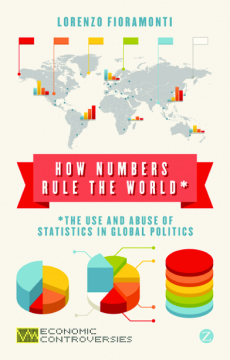
Additional Information
Book Details
Abstract
Numbers dominate global politics and, as a result, our everyday lives. Credit ratings steer financial markets and can make or break the future of entire nations. GDP drives our economies. Stock market indices flood our media and national debates. Statistical calculations define how we deal with climate change, poverty and sustainability. But what is behind these numbers?
In How Numbers Rule the World, Lorenzo Fioramonti reveals the hidden agendas underpinning the use of statistics and those who control them. Most worryingly, he shows how numbers have been used as a means to reinforce the grip of markets on our social and political life, curtailing public participation and rational debate.
An innovative and timely exposé of the politics, power and contestation of numbers.
'Lorenzo Fioramonti has written an urgent and highly accessible book, showing just how over-reliant our governance systems are on misleading numbers, which support market power and blur our understanding of the world. And it is also a better and more compelling read than exactly 95.4% of all other important books!'
David Boyle, author of The Tyranny of Numbers
'This book is a thoughtful political economic analysis of how our fates have come to be determined by a few numbers, and how these numbers have been shaped by a few people. If we want a vibrant and responsive politics, we’ll need to know where it has been enclosed by the world's powerful accountants. Fioramonti’s book provides an excellent map.'
Raj Patel, author of The Value of Nothing: How to Reshape Market Society and Redefine Democracy
'Timely and original, scholarly without ostentation, often scathing, Lorenzo Fioramonti's field guide to the prejudices, assumptions, financial interests and ideology that lurk behind the most innocent-seeming numbers equips us to challenge their spurious authority. Faith in numbers has helped to wreck the financial system, masked fraud and criminal activity, allowed the world's richest people to meddle in the "development" of societies they know nothing about and could lead us to damage our earthly habitat beyond recall. If you want to learn what numbers reveal and conceal; what can and, above all, can't be measured, don't trust the "experts" - read How Numbers Rule the World and become an expert yourself.'
Susan George, author of Whose Crisis, Whose Future? and President of the Board, Transnational Institute
Lorenzo Fioramonti (@globalreboot) is associate professor and Jean Monnet chair in regional integration and governance studies at the University of Pretoria, South Africa, where he directs the Centre for the Study of Governance Innovation. He is also senior fellow at the Centre for Social Investment of the University of Heidelberg and at the Hertie School of Governance, Germany, as well as associate fellow at the United Nations University. He is the author of several books about development policies, global and regional governance, alternative economies and social progress indicators, including Gross Domestic Problem: The Politics Behind the World's Most Powerful Number (Zed Books, 2013). He blogs at www.globalreboot.org.
Table of Contents
| Section Title | Page | Action | Price |
|---|---|---|---|
| Front cover | Front cover | ||
| Economic Controversies | i | ||
| About the author | ii | ||
| Title | iii | ||
| Copyright | iv | ||
| Contents | v | ||
| Acknowledgements | vi | ||
| INTRODUCTION The politics of statistics | 1 | ||
| 1 The power of numbers | 10 | ||
| Numbers and politics | 14 | ||
| Trust in numbers | 19 | ||
| Numbers, markets and democracy | 27 | ||
| 2 New global rulers: the untameable power of credit rating | 39 | ||
| Credit rating agencies: from market analysts to oligopolists | 43 | ||
| Behind the numbers: a shady business | 47 | ||
| The politics of ratings and the global financial crisis | 52 | ||
| Ratings and irrationality | 61 | ||
| 3 Fiddling while the planet burns: the marketization of climate change | 68 | ||
| Environmental scepticism and the rise of cost–benefit analysis | 70 | ||
| Climategate: twisting numbers for the climate | 76 | ||
| Markets for climate | 86 | ||
| Conclusion: when numbers become dangerous distractions | 98 | ||
| 4 Measuring the unmeasurable: the financialization of nature | 104 | ||
| Measuring the value of nature: statistical evolutions in global governance | 108 | ||
| figure 4.1 Conceptualizing nature’s contribution to the economy | 112 | ||
| Putting a price on ecosystems | 115 | ||
| The financialization of nature | 127 | ||
| Conclusion: Nature Inc. | 136 | ||
| 5 Numbers for good? The quest for aid effectiveness and social impact | 144 | ||
| The politics of aid effectiveness: a brief historical overview | 148 | ||
| The quest for evidence | 156 | ||
| The rise of philanthrocapitalism | 166 | ||
| Numbers strike back home: the politics of impact assessment in the social field | 174 | ||
| The marketization of ‘doing good’ | 184 | ||
| CONCLUSION Rethinking numbers, rethinking governance | 192 | ||
| In defence of numbers | 195 | ||
| Beyond good and bad numbers | 198 | ||
| Governance, numbers and the public sphere | 203 | ||
| What now? Governance of complexity | 210 | ||
| Notes | 214 | ||
| Bibliography | 246 | ||
| Index | 261 | ||
| Back cover | Back cover |
